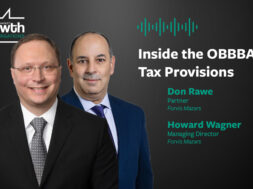Middle-Market Public Policy Roundup
A Senate bill expanding small business aid faces likely approval, the Fed considers improvements to PPP loans, and ACG urges amendments to Main Street Lending Program.

In this week’s roundup, we look at the Senate’s plan to expand funding for the Paycheck Protection Program, which is expected to be approved today by the House and signed into law by President Trump. We also summarize rule changes the Federal Reserve is considering to improve access to loans for small businesses, and the Association for Corporate Growth’s letter to the central bank on how it can improve its Main Street Lending Program.
Stimulus Boost Faces Likely Approval by House, Trump
House leaders are set to meet on Thursday to vote on nearly half a trillion dollars in additional aid for small businesses and health care providers struggling during the COVID-19 outbreak.
The $484 billion bill, approved by the Senate on Tuesday, will replenish federal programs designed to offer relief to small businesses negatively impacted by the coronavirus pandemic. President Donald Trump has already voiced his support of the bill and said he would sign it into law as soon as possible.
The bill allocates around $310 billion in loans for the small business lending program, known as the Paycheck Protection Program, after it exhausted $350 billion provided by the CARES Act last week. Hospitals and other health care providers are set to receive $75 billion.
Small businesses raised concerns that companies with existing ties with banks had an unfair advantage when obtaining loans. The Senate package has earmarked $60 billion for smaller lending providers, including community financial institutions and credit unions, that would make funds easier to access for small businesses without well-established relationships with big banks.
Chair of the House Financial Services Committee Rep. Maxine Waters, D-Calif., voiced her support of the aid expansion, applauding the Senate bill’s funding commitment to small lenders. “[They] are well-positioned in communities across the country to lend to the neighborhood small businesses that need funding the most,” she said in a statement.
Securing funding to cover workers’ paychecks has become an increasingly important point to policymakers as they try to limit the economic impact created by the coronavirus. According to figures published by the Department of Labor on Thursday, an additional 4.4 million Americans have filed for unemployment since last week, bringing the total number of applicants since last month to more than 26 million.
Republican lawmakers supported a multibillion-dollar stopgap last week to prevent a funding lapse in the PPP program, which was hamstrung by attempts from Democrats to allocate aid for local governments.
Trump has supported sending federal dollars to local municipalities whose budgets have taken a hit from the pandemic, but said he would consider it in future relief.
Fed Announces Rule Change for Paycheck Protection Program
The Federal Reserve Board on April 17 announced a rule change to bolster the effectiveness of the Small Business Administration’s Paycheck Protection Program.
The change will temporarily modify the Fed’s rules to enable certain bank directors and shareholders to apply for PPP loans for their small businesses, the Fed said in a statement.
The Fed rules limit the types and quantity of loans that bank directors, shareholders, officers and businesses owned by these persons can receive from their related banks, which it said would prevent favoritism.
“These requirements have prevented some small business owners from accessing PPP loans—especially in rural areas,” the Fed said.
The SBA recently clarified that PPP lenders can make loans to businesses owned by their directors and certain shareholders, subject to certain limits and without favoritism. The change will allow those individuals to apply for PPP loans, consistent with SBA’s rules and restrictions.
The rule change is effective immediately and will be in place while the PPP is active. Comments will be accepted for 45 days after publication in the Federal Register.
ACG Submits Comments on Fed’s Main Street Lending Program
The Association for Corporate Growth sent comments to the Federal Reserve late last week regarding the recently announced Main Street Lending Program.
Created under the CARES Act, the program would help middle-market companies secure loans to support business operations during the COVID-19 pandemic.
However, ACG pointed out some limitations in the program and advised the Fed to improve some of its offerings to support job retention and growth. It recommended changes to several of the program’s criteria, including EBITDA loan sizing requirements and qualifications for eligible lenders.
“We urge the Federal Reserve to be liberal in allowing access to the relief loans intended to keep people employed and businesses operating and to respect the judgment of business leaders who are willing to assume debt as a means to survive this crisis,” Tom Bohn, ACG Global president and CEO, and Martin Okner, chairman of the ACG Global Board of Directors, wrote in a statement. “Consumer confidence will never rebound if Americans are not gainfully employed.”
Read ACG’s full comment letter to the Federal Reserve here.

Benjamin Glick is Middle Market Growth’s associate editor.


